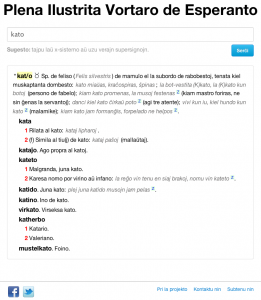Important dictionary now online: PIV Posted by Chuck Smith on Apr 6, 2012 in Esperanto Language, Literature
Perhaps you’ve heard of the largest Esperanto-Esperanto dictionary called the Plena Ilustrita Vortaro (PIV)? Well, now you can access PIV online! It’s still in beta, so you will have to sign up for a free account to access it (if you already have a lernu account, you can login with that). Then enter any word and you’ll see its definition in a well-formatted entry as you can see on the right. Also, if you don’t understand one of the abbreviations in the entry, like (tr) which means something is a transitive verb, you can just move your mouse over the abbreviation to see what it means (or tap on a tablet computer).
You might find it difficult to learn a language without having translations into your native language, but I find this method much better for truly understanding a language. In any foreign language, I recommend first looking up a word in a beginner’s dictionary of its own language, then trying to understand it from there. Most of the time you’ll succeed! When not, you can look up the other words in the definition until you figure it out, like a challenging puzzle. I used this method a lot for learning French and found it helped me a lot.
Another reason I’m really happy to see PIV online is that the cost of the book is often prohibitive for students, people living in less developed countries or even those who want to just dip their toes in the language, but don’t see themselves spending $103 to buy it from Esperanto-USA. The largest Esperanto bookseller, the Universal Esperanto Association, is currently out of stock, but previously sold it for €93. Unfortunately, you have to log in to view this material. This is particularly unfortunate as it will make it difficult to show this amazing tool to our non-Esperanto speaking friends, since most people won’t register for an account just to view a dictionary in a language they don’t speak. Hopefully they will remove this barrier when the site ends its beta period, but there has currently been no answer from Education@Internet as to the reason for this restriction.
This should, however, give every Esperanto speaker one more tool at their disposal, especially when writing. It will also be a huge help at congresses, because very few people want to carry the thick and heavy PIV in their luggage while travelling abroad. Then when there is a language question, one quick look at a smart phone or laptop should resolve the argument… and we know Esperanto speakers love to argue about proper word usage!
I would like to end by remembering a conversation with Flavio Rebello who runs the news portal Nunonia (more well-known for previously running Ĝangalo.com). He used a somewhat obscure word in one of his articles and I mentioned that the word cannot be found in the Reta Vortaro, so therefore people will have difficulty understanding the article. He replied saying that Ĝangalo isn’t a news portal for beginners and doesn’t want to have to dumb down his vocabulary, because this is an important news source. In retrospect, I have to agree with his answer. In any case, I hope the online PIV will help you express yourself better and improve your understanding of Esperanto. Try it out now at vortaro.net!
For more details about the work behind the online PIV, see the following article at Libera Folio: Reta PIV fine aperos (in Esperanto)
Update: I have since learned that the login was a requirement from SAT, which publishes the book. They feared that people would run automated scripts to download the entire work. So, if you want this changed, complain to them. (Update: as of 2017, login is no longer required.)

Build vocabulary, practice pronunciation, and more with Transparent Language Online. Available anytime, anywhere, on any device.
About the Author: Chuck Smith
I was born in the US, but Esperanto has led me all over the world. I started teaching myself Esperanto on a whim in 2001, not knowing how it would change my life. The timing couldn’t have been better; around that same time I discovered Wikipedia in it’s very early stages and launched the Esperanto version. When I decided to backpack through Europe, I found Esperanto speakers to host me. These connections led me to the Esperanto Youth Organization in Rotterdam, where I worked for a year, using Esperanto as my primary language. Though in recent years I’ve moved on to other endeavors like iOS development, I remain deeply engrained in the Esperanto community, and love keeping you informed of the latest news. The best thing that came from learning Esperanto has been the opportunity to connect with fellow speakers around the globe, so feel free to join in the conversation with a comment! I am now the founder and CTO of the social app Amikumu.





Comments:
WC:
Oh wow, I find that dictionary really easy to understand, too. This is an awesome resource. Maybe I can finally get around to reading some books in Esperanto. The only other online dictionary I knew of was pretty hard to use.
I hope they’ll make a popup-dictionary browser plugin as well. That would be worth paying for and would definitely help drive adoption of Esperanto.
Manoochehr Danesh:
I woud like to know more abaut this beautiful dictionery.
Tomaso:
@Manoochehr Danesh What do you want to know? Go to vortaro.net and see for yourself.